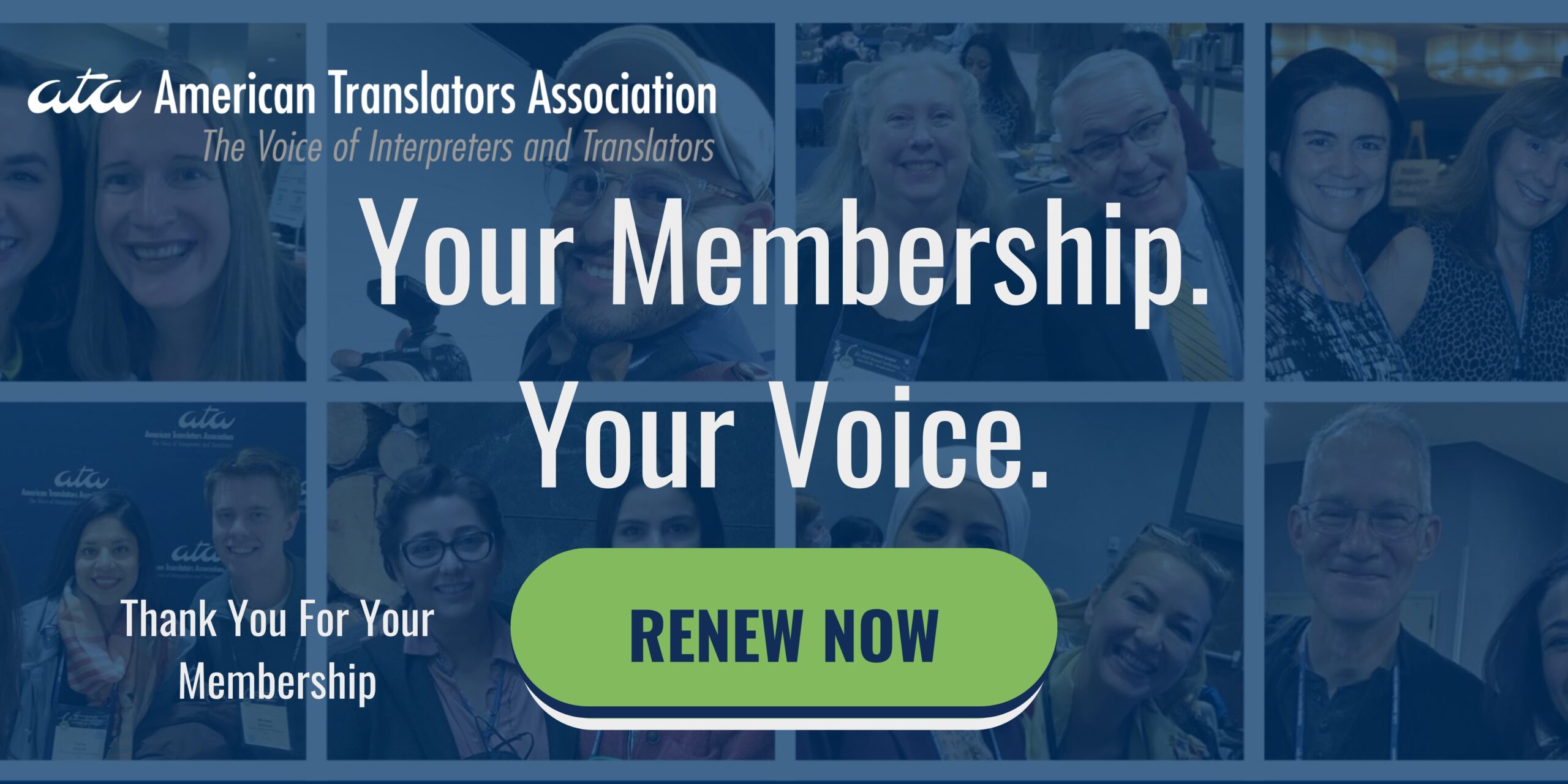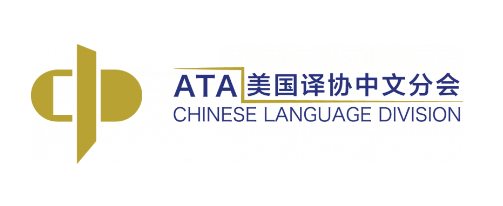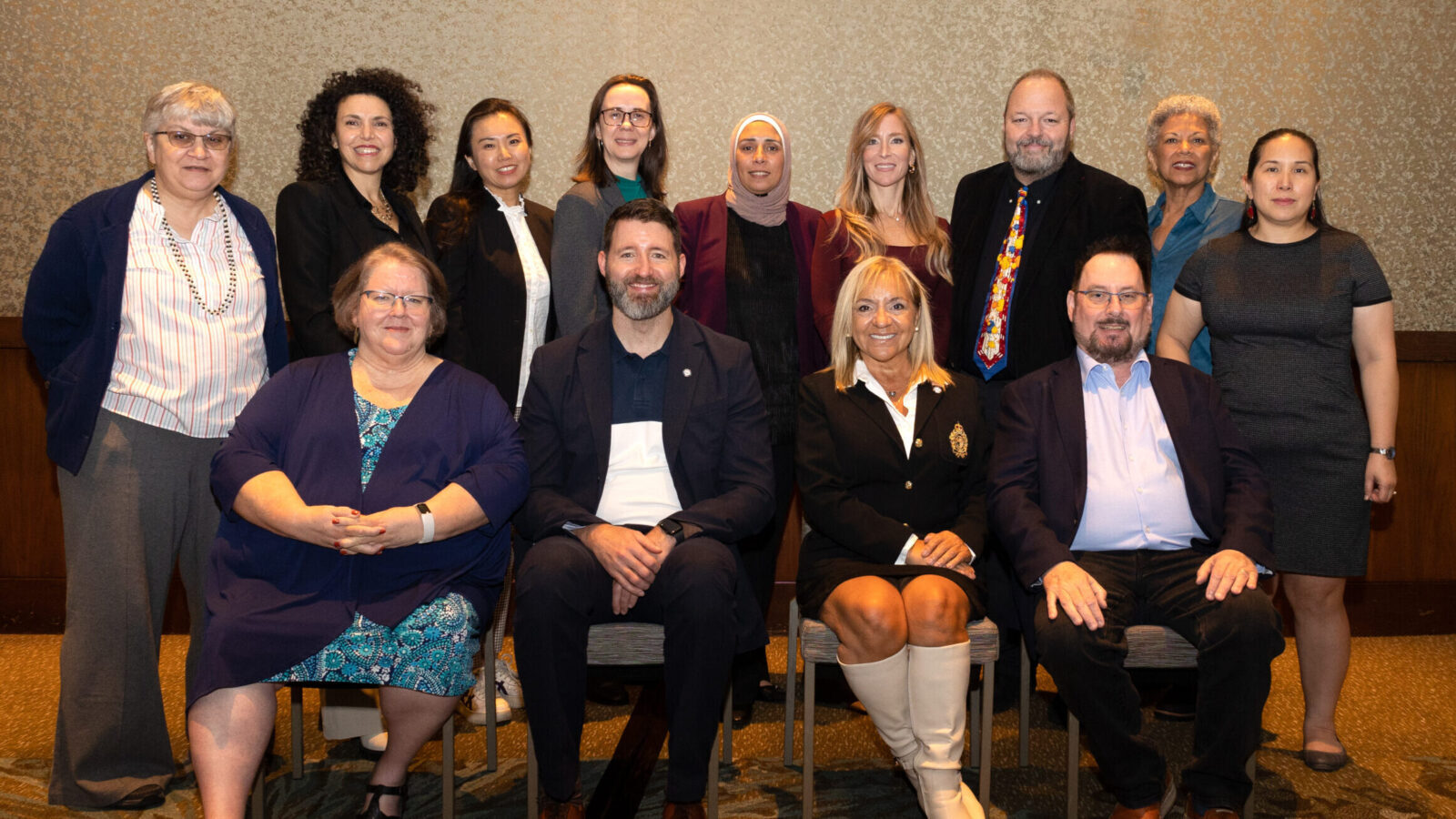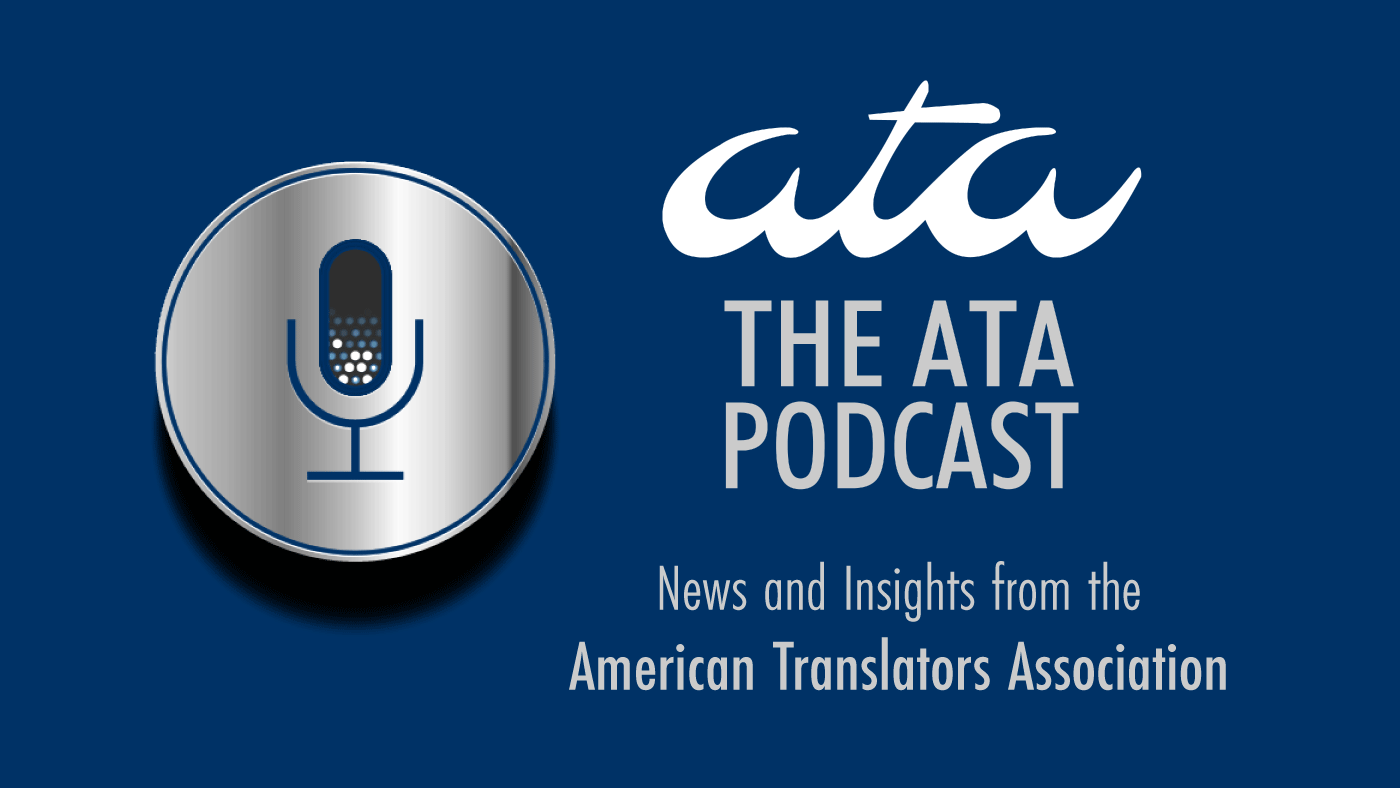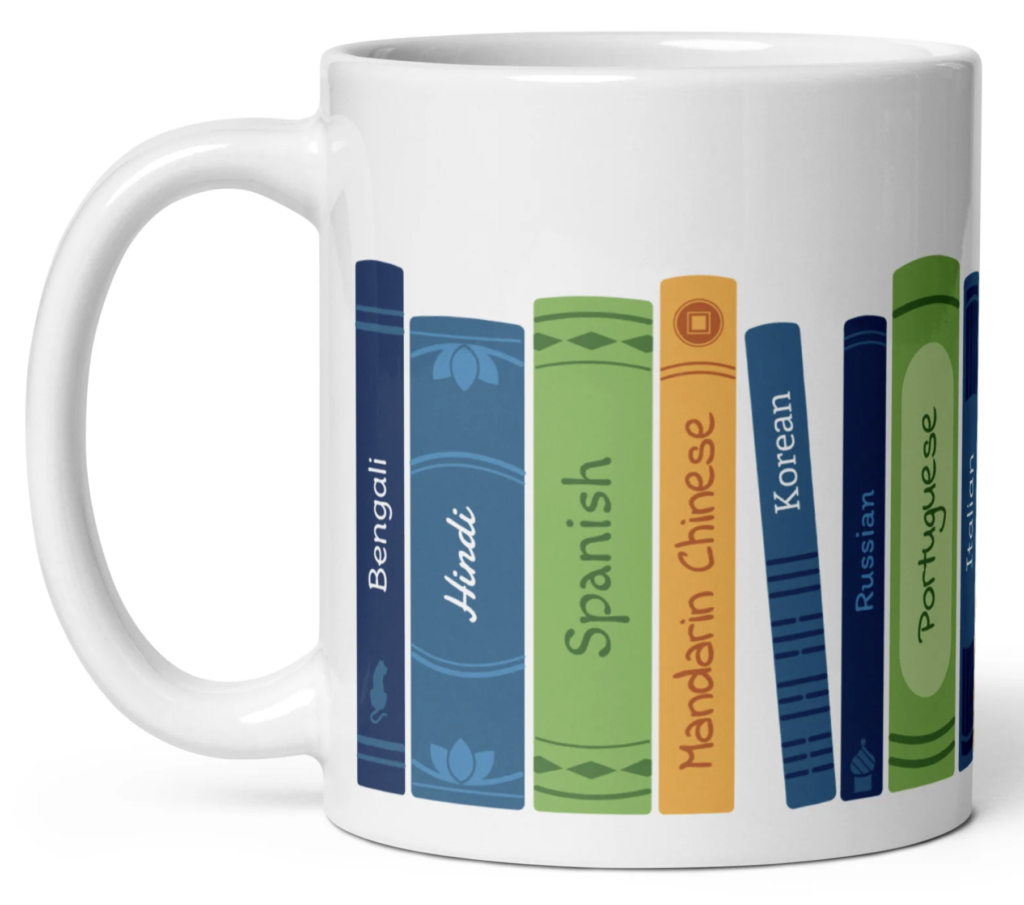What's Happening Now?
ATA provides a snapshot of the current news, events, articles, podcasts, and more. ATA members receive a monthly e-newsletter that highlights this vital information.
Belonging to a community of colleagues who are facing the same challenges as you has never been more important. Whether you’re connecting with colleagues through free membership in any of our divisions and special interest groups, learning valuable skills from expert speakers during one of our webinars or at the Annual Conference, or exchanging challenges and solutions during networking events, meet-ups, or on ATA’s social media platforms, you’ll find that ATA members are there for each other. Don’t go at it alone in 2026.
Tax Deduction Reminder
If you plan to include payment of your 2026 membership dues on your 2025 tax return, you must renew by December 31. Please consult your accountant for tax advice.
Questions? Need Additional Information?
Your satisfaction is important to us! If you have questions or concerns about ATA member benefits or services, email membership@atanet.org or call +1 (703) 683-6100, extension 3001.
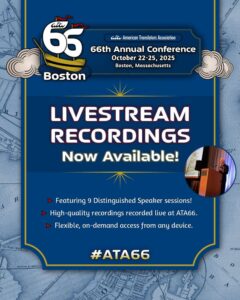 Didn’t make it to Boston for ATA66, or want to revisit the insights everyone’s still talking about? Great news! The ATA66 Boston Livestream Sessions are now available on demand!
Didn’t make it to Boston for ATA66, or want to revisit the insights everyone’s still talking about? Great news! The ATA66 Boston Livestream Sessions are now available on demand!
You can now access nine expertly curated sessions packed with practical strategies, industry knowledge, and forward-thinking perspectives from leaders in translation and interpreting.
What Do You Get?
- 9 one-hour sessions featuring distinguished speakers representing ATA divisions.
- High-quality video and audio recordings recorded live from ATA66 in Boston.
- Flexible, on-demand access—watch anytime, from any device!
Whether you’re looking to sharpen your skills, stay ahead of industry trends, or get inspired by top professionals, the ATA66 Livestream Sessions deliver exceptional value for freelancers, language companies, educators, and anyone working in T&I.
Don’t miss your chance to experience the best of ATA66—even if you weren’t there in person!
ATA actively works with government agencies and organizations on the issues that affect you. Through ATA's advocacy efforts, you will benefit from the success we achieve together. Being an ATA member supports these efforts.
The White House is making an unusual argument as it resists advocates’ push for sign language interpreting at press briefings conducted by President Donald Trump and Press Secretary Karoline Leavitt.
Providing American Sign Language (ASL) interpreting at press conferences “would severely intrude on the president’s prerogative to control the image he presents to the public,” Department of Justice (DOJ) attorneys argued in a lawsuit filed by the National Association of the Deaf (NAD).
The novel argument is just one part of the White House’s case against providing ASL interpreting, and DOJ attorneys haven’t elaborated on the alleged intrusion. But it has raised concerns among advocates, and even the judge in the case.
U.S. District Judge Amir Ali issued an order in November requiring the White House to provide real-time ASL interpreting for Trump and Leavitt’s briefings, rejecting the administration’s argument that closed captioning and transcripts give Americans who are Deaf or hard of hearing sufficient access to the president’s statements.
The Trump administration immediately appealed Ali’s ruling. The White House has begun providing interpreting for more events since the court issued its injunction, although the two sides of the case have disagreed over the specifics of what’s required.
The administration has argued that complications could arise if, for example, Trump spontaneously chooses to take questions from the press at events other than briefings. The Trump administration has asked Judge Ali to limit his ruling to events scheduled at least 24 hours in advance, but the judge said the White House’s concerns were based on a misunderstanding of his order, which requires officials to “take all reasonable steps” to provide interpreting whenever they have advance knowledge that Trump or Leavitt will provide information or take questions.
The plaintiffs have also noted that President Joe Biden’s administration was able to provide ASL interpreting for events that were announced to the press pool less than an hour before Biden delivered his remarks.
“The disability laws don’t require a showing of animus or ill will toward people with disabilities to prove discrimination. The laws require that the White House provide access, and the failure to provide that access is itself discrimination,” said Brittany Shrader, director of legal services at the NAD Law and Advocacy Center. “The White House’s arguments are not a sound basis for declining to provide reasonable accommodations.”
POLITICO (12/11/25) By Hassan Ali Kanu
Interpreters who work on Parliament Hill say changes to their accreditation process risk degrading the quality of interpreting services in Canada’s federal government.
The Translation Bureau, which provides translation and interpreting services to government organizations, has begun using an external consultant during accreditation exams instead of a jury of senior interpreters from within the bureau.
As of November, an external juror has carried the same weight as four staff interpreters combined previously. According to the Canadian chapter of the International Association of Conference Interpreters (AIIC-Canada), a Translation Bureau executive will break the tie in the case of a disagreement.
AIIC-Canada is warning that the race to fill interpreter positions will result in lesser-quality interpreting of committee hearings, Q&A periods, and beyond.
“I think really the most important thing is that it’s really sad to see that the Translation Bureau is giving priority to just filling in the spots over quality,” said Alionka Skup, president of AIIC-Canada. “It’s really the impact on the quality of official languages, at Parliament of all places, where you need high-quality interpreting to make sure that parliamentarians understand one another and can do their job properly for their constituents.”
Michèle LaRose, a spokesperson for Public Services and Procurement Canada, said the Translation Bureau was now including “independent experts from the high-level conference interpreting community to provide an external perspective on the evaluations.”
“This allowed us to obtain a diversity of opinions from experts in their field, ensure greater transparency in the process, and inform any necessary improvements to the process,” said LaRose, who added that there were “no changes to the evaluation criteria from previous years, and performance and quality expectations remain the same.”
Ottawa Citizen (12/11/25) By Matteo Cimellaro
The Connecticut State Department of Education has published a new framework to help school districts support English-learning and multi-language learning students.
The framework, which the department has been working on since 2021, outlines the best ways school districts can support their multilingual learners, starting from the administration down to the classroom instructor.
Evelyn Robles-Rivas, director of the Multilingual Learners Program with New Haven Public Schools, applauded the state for publishing a detail-oriented guide.
“This is a great step. I think the State Department of Education is taking it seriously, understanding that our students matter and the success of multilingual learners means the success of all students in the district,” Robles-Rivas said.
The framework is structured around four principles: 1) access to high-quality skilled educators; 2) evidence-based practices guided by research; 3) the need to create family and community engagement; and 4) reflection and continuous improvement.
Marissa Ferraro, coordinator of elementary bilingual programs with Southern Connecticut State University, believes the framework will encourage educators to become language-certified, as it highlights receiving district support. “I would imagine that anybody in the field who has worked with multilingual students will embrace these guidelines, because it helps classroom educators amplify their voice and ask their administrators for support.”
Ferraro added that the framework also helps place an emphasis on the shared responsibility of educating multilingual students.
“Students are doing a huge amount of work and need the support of not only their bilingual teacher, but support across the spectrum, from classroom leaders to administrators and beyond,” Ferraro said.
NBC Connecticut (12/8/25) By Jennifer Cuevas
The Judicial Council of California has approved recommendations from a study on how to expand access to the pool of court interpreters able to assist the state’s nearly 6.4 million limited-English-proficient (LEP) residents and potential court users.
Study considerations for the council include reviewing interpreter examination standards and content, adopting carryover scoring to aid candidates, and creating structured career pathways—including tiered systems and apprenticeship programs, particularly for Spanish interpreters. The study also advises the council to work with courts to develop a statewide directory for interpreters trained in video remote interpreting and to continue expanding access to American Sign Language and emerging languages.
The study also calls for action by the legislature, courts, and experienced court interpreters, which includes recommendations to continue adequately funding interpreter services, review and improve compensation packages, and develop mentorship programs.
“There was broad agreement among the stakeholders for the recommendations and considerations,” said Court Executive Officer Anabel Romero, vice-chair of the council’s Court Interpreters Advisory Panel. “The study offers a roadmap for the branch to improve interpreter services for the public and to ensure our goals of high-quality equitable access for all Californians, regardless of the language they speak.”
California Courts Newsroom (12/12/25) By Blaine Corren
The American Literary Translators Association (ALTA) announced the winners of the 2025 National Translation Awards (NTA) in Poetry and Prose as part of ALTA’s annual conference (ALTA48) in Tucson, Arizona.
2025 marks the 27th year for the NTA, and the 11th year to award separate prizes in poetry and prose. The National Translation Awards are awarded annually to literary translators who have made an outstanding contribution to literature in English by recreating the artistic force of a book of consummate quality.
The winner of the 2025 NTA in Poetry is Document Shredding Museum by Afrizal Malna, translated from Indonesian by Daniel Owen, published by World Poetry Books.
The winner of the 2025 NTA in Prose is Sand-Catcher by Omar Khalifah, translated from Arabic by Barbara Romaine, published by Coffee House Press.
Both winners were present at ALTA48 and read brief remarks and a selected passage from the winning translated books. The winners will each receive a $4,000 cash prize.
The 2025 judges in the poetry category were Conor Bracken, Dongshin Chang, and Rachel Galvin, and in the prose category were Peter Constantine, Ilze Duarte, George Henson, Hoyoung Moon, and Manjushree Thapa.
The 2026 NTA submissions portal will open in January 2026.
American Literary Translators Association (12/4/25)
More T&I News
Ditch the Translation App and Use Your Mediocre French | The Atlantic
Amid Shortages, Ohio Supreme Court Amends Requirements for Court Interpreters | The Ohio Newsroom
Australia’s Federal Family Court Issues Stringent New Interpreter Rules | Slator
First Comprehensive Ancient Celtic Dictionary Underway | BBC
Why Honoring Home Languages Matters in Education | SmartBrief
Cree Radio Network Joins Platform to Create Online Language Learning Games | CBC
ATA members are exploring the possibility of adding two more language pairs to ATA’s Certification Program.
English into Turkish
If you are a qualified translator or interpreter and would consider becoming ATA-certified, please contact Özüm Arzik Erzurumlu at oarzike@illinois.edu. Your response will help assess interest and determine the next steps. Thank you!
Hebrew into English
If you are a qualified translator or interpreter and would consider becoming ATA-certified, please contact Grace Shalhoub at gshal.traduction@gmail.com. Signatures are needed from ATA members and non-members alike.
Discover how to run a profitable business while staying happy and balanced. Learn how to connect with your passion, break limiting beliefs, and strengthen self-esteem, while gaining practical insights for…
Learn MoreClient education is a critical yet often overlooked component of a successful freelance legal translation and interpreting business. This session will explore the benefits and strategies of effective client education,…
Learn MoreGet a refresher on all the benefits of your ATA membership! ATA is continuously working to add more benefits for our members. In fact, there are so many, even longtime…
Learn MoreElevate your approach to terminology, strengthen your linguistic insight, and boost your professional intuition. Register now and rediscover the fundamental power of words. In the dynamic world of translation and…
Learn MoreThe ATA Board of Directors meets four times a year to establish policy, develop goals and objectives, and oversee ATA’s finances. Get to know ATA’s Board of Directors. Want to attend…
Learn MoreThis space is dedicated to celebrating the accomplishments of our members!
Christina Green has been elected chair of the North America Regional Center of the International Federation of Translators (FIT) (2025–2028).
Submit Your Member News!
Do you have news to share with us? If so, you might be featured on our social media channels.
Independent Contracting from A to Z: Everything Translators & Interpreters Need to Know
Starting your career as a freelance translator or interpreter is exciting, but it can also feel overwhelming. Beyond your linguistic skills, you’re stepping into the world of independent contracting: contracts,…
Read MoreGuide to Buying Interpreting Services, Part V: Interpreting Terms to Know
Interpreters help power the global economy, working with businesses, governments, non-profits and individuals. They are an integral part of global communication. Interpreters work with the spoken or signed word. The…
Read MoreE115: ASTM Standards on Language Services Explained
Listen and learn how standards and best practices signal to the world that you care about the quality of your work and your profession.
Listen to PodcastThe ATA Chronicle
ATA’s flagship publication since 1972 The ATA Chronicle is the official publication of the American Translators Association. Published six times per year, each issue offers resources and practical solutions to…
Learn MoreFree Monthly Webinar
ATA offers members a free webinar each month, available on-demand for 30 days. Don't miss this month's freebie!
Developing Expertise in Interpreting: Reflection, Feedback, and Repetition
Explore strategies for constructive feedback and deliberate practice in this interactive webinar, focusing on refining interpreting skills through guided reflection, repetition, and collaboration. Interpreting expertise cannot be achieved by simply…
Watch Free WebinarIssues of Newsbriefs
Get the Member Advantage
ATA members are ready for any challenge with the support of a collaborative community, effective education, and 24/7 promotion in ATA’s Language Services Directory.
Get Noticed!
Advertise in Newsbriefs to reach ATA members each month. Consistently high open rates guarantee your advertising will be seen by thousands of professionals!
